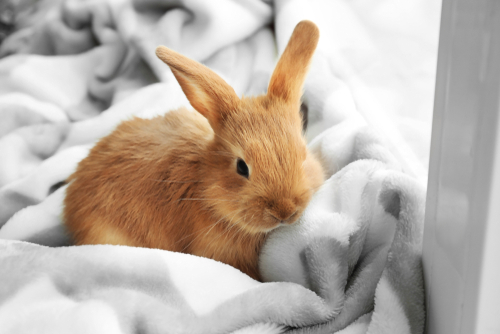
What is RHDV2?
Rabbit hemorrhagic disease is nearly always a fatal disease in rabbits. In February 2020, animal health officials detected rabbit hemorrhagic disease virus serotype 2 (RHDV2) for the third time in the United States, since 2018. Since that detection, RHDV2 has spread to multiple states. RHDV2 does not impact human health, but it is highly contagious among rabbits and, unlike other rabbit hemorrhagic disease viruses, it affects both domestic and wild rabbits. Many times, the only signs of the disease are sudden death and blood stained noses caused by internal bleeding. Infected rabbits may also develop a fever, be hesitant to eat, or show respiratory or nervous signs.
How contagious is Rabbit Hemorrhagic Virus?
RHDV2 is highly contagious. In an infected population, mortality may reach 100%. The RHDV2 virus is very resistant to extreme temperatures. It can be spread through direct contact or exposure to an infected rabbit’s excretions or blood. The virus can also survive and spread from carcasses, food, water, and any contaminated materials. People can spread the virus indirectly by carrying it on their clothing and shoes.
What should I know about the vaccine?
Medgene Labs of Brookings, DS developed a new vaccine and gained emergency use authorization from the USDA after review of current safety and challenge information. The vaccine is delivered through a subcutaneous injection and is a two-dose regimen, with the second dose being administered 21 days after the first dose. One dose will NOT protect your rabbit from contracting RHD.
The vaccine should be fully protective 35 days after the first dose and 14 days after the second dose. Kits can be vaccinated at or after 4 weeks of age.
Are there side effects?
Of more than 100 adult rabbits and kits injected with the vaccine, 1 rabbit and one kit had minor post-injection swelling at the vaccine site, and the swelling fully resolved within 48 hours.
Is it safe for previously vaccinated rabbits to be vaccinated with the new vaccine? Will they need the initial booster?
This vaccine has gone through safety testing in accordance with USDA standards. It has been determined to be safe and approved for use with a two-dose regimen. (So yes, your previously vaccinated bunny should still receive the initial vaccine and the booster dose.)
Could my rabbit infect other rabbits after being vaccinated?
NO. This vaccine only uses parts (proteins) from the virus to build immunity. It is impossible for a rabbit that receives this vaccine to shed any virus since it does not contain the full RDHV2 virus.
Links to further information on Rabbit Hemorrhagic Virus:
Cornell University Wildlife Health Lab
https://cwhl.vet.cornell.edu/disease/rabbit-hemorrhagic-disease
American Veterinary Medical Association:
United States Department of Agriculture
https://www.aphis.usda.gov/publications/animal_health/fs-rhdv2.pdf


